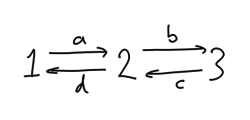Difference between revisions of "M(8,4,2)"
(Pic_O) |
|||
| (One intermediate revision by the same user not shown) | |||
| Line 28: | Line 28: | ||
\end{array}\right)</math> | \end{array}\right)</math> | ||
|O-morita-frob = 1 | |O-morita-frob = 1 | ||
| − | |Pic-O = | + | |Pic-O = <math>C_2</math><ref>[[References|[Mar]]]</ref> |
|source? = No | |source? = No | ||
|sourcereps = | |sourcereps = | ||
| Line 46: | Line 46: | ||
'''Quiver:''' a:<1,2>, b:<2,3>, c:<3,2>, d:<2,1> | '''Quiver:''' a:<1,2>, b:<2,3>, c:<3,2>, d:<2,1> | ||
| − | '''Relations w.r.t. <math>k</math>:''' ada=abcdabc, dad=bcdabcd, cbc=cdabcda, bcb=dabcdab, adab=cbcd | + | '''Relations w.r.t. <math>k</math>:''' ada=abcdabc, dad=bcdabcd, cbc=cdabcda, bcb=dabcdab, adab=cbcd=0 |
== Other notatable representatives == | == Other notatable representatives == | ||
| Line 90: | Line 90: | ||
[[Q8|Back to <math>Q_8</math>]] | [[Q8|Back to <math>Q_8</math>]] | ||
| + | |||
| + | == Notes == | ||
| + | |||
| + | <references /> | ||
[[Category: Morita equivalence classes|8,4,2]] | [[Category: Morita equivalence classes|8,4,2]] | ||
[[Category: Blocks with defect group Q8]] | [[Category: Blocks with defect group Q8]] | ||
[[Category: Tame blocks|8,4,2]] | [[Category: Tame blocks|8,4,2]] | ||
Latest revision as of 08:40, 24 May 2022
| Representative: | [math]B_0(kSL_2(5))[/math] |
|---|---|
| Defect groups: | [math]Q_8[/math] |
| Inertial quotients: | [math]C_3[/math] |
| [math]k(B)=[/math] | 7 |
| [math]l(B)=[/math] | 3 |
| [math]{\rm mf}_k(B)=[/math] | 1 |
| [math]{\rm Pic}_k(B)=[/math] | |
| Cartan matrix: | [math]\left( \begin{array}{ccc} 4 & 4 & 2 \\ 4 & 8 & 4 \\ 2 & 4 & 4 \\ \end{array} \right)[/math] |
| Defect group Morita invariant? | Yes |
| Inertial quotient Morita invariant? | Yes |
| [math]\mathcal{O}[/math]-Morita classes known? | Yes |
| [math]\mathcal{O}[/math]-Morita classes: | [math]B_0(\mathcal{O}SL_2(5))[/math] |
| Decomposition matrices: | [math]\left( \begin{array}{ccc} 0 & 1 & 0 \\ 1 & 1 & 0 \\ 0 & 1 & 1 \\ 1 & 1 & 1 \\ 1 & 0 & 0 \\ 0 & 0 & 1 \\ 1 & 2 & 1 \\ \end{array}\right)[/math] |
| [math]{\rm mf}_\mathcal{O}(B)=[/math] | 1 |
| [math]{\rm Pic}_{\mathcal{O}}(B)=[/math] | [math]C_2[/math][1] |
| [math]PI(B)=[/math] | {{{PIgroup}}} |
| Source algebras known? | No |
| Source algebra reps: | |
| [math]k[/math]-derived equiv. classes known? | Yes |
| [math]k[/math]-derived equivalent to: | M(8,4,3) |
| [math]\mathcal{O}[/math]-derived equiv. classes known? | No |
| [math]p'[/math]-index covering blocks: | |
| [math]p'[/math]-index covered blocks: | |
| Index [math]p[/math] covering blocks: |
These are tame blocks, and appear in the family [math]D(3 {\cal A})_2[/math] in Erdmann's classification (see [Er88a], [Er88b]). The class lifts to a unique [math]\mathcal{O}[/math]-Morita equivalence class by [Ei16]. A derived equivalence with M(8,4,3) over [math]k[/math] was established in [Ho97].
Contents
Basic algebra
Quiver: a:<1,2>, b:<2,3>, c:<3,2>, d:<2,1>
Relations w.r.t. [math]k[/math]: ada=abcdabc, dad=bcdabcd, cbc=cdabcda, bcb=dabcdab, adab=cbcd=0
Other notatable representatives
Projective indecomposable modules
Labelling the simple [math]B[/math]-modules by [math]1,2,3[/math], the projective indecomposable modules have Loewy structure as follows:
[math]\begin{array}{ccc} \begin{array}{ccc} & 1 & \\ & 2 & \\ \begin{array}{c} 1 \\ \end{array} & \oplus & \begin{array}{c} 3 \\ 2 \\ 1 \\ 2 \\ 3 \\ \end{array} \\ & 2 & \\ & 1 & \\ \end{array}, & \begin{array}{c} 2 \\ 1 \ 3 \\ 2 \ 2 \\ 3 \ 1 \\ 2 \ 2 \\ 1 \ 3 \\ 2 \ 2 \\ 3 \ 1 \\ 2 \\ \end{array}, & \begin{array}{ccc} & 3 & \\ & 2 & \\ \begin{array}{c} 3 \\ \end{array} & \oplus & \begin{array}{c} 1 \\ 2 \\ 3 \\ 2 \\ 1 \\ \end{array} \\ & 2 & \\ & 3 & \\ \end{array} \end{array} [/math]
Irreducible characters
[math]k_0(B)=4, k_1(B)=3[/math]
